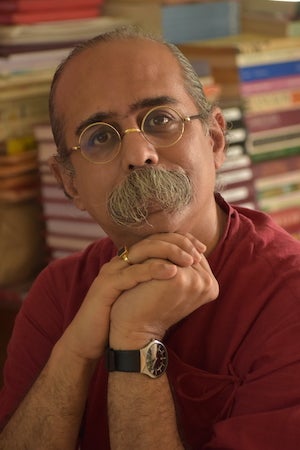Our faculty engage in cutting-edge research and innovative creative work every day as they bring new ideas to our students and communities locally and globally. We’re pleased to continue this monthly spotlight series featuring our faculty’s work through a question-and-answer style article published on the first Friday of every month during the academic year.
Featured book: Bureaucratic Archaeology: State, Science, and Past in Postcolonial India (Cambridge University Press, August 2021), by Professor Ashish Chadha, Film/Media Program
Q. Can you give us a brief synopsis of your new book Bureaucratic Archaeology: State, Science, and Past in Postcolonial India?
This book is a multi-faceted ethnography of quotidian practices of archaeology, bureaucracy and science in postcolonial India, concentrating on the workings of Archaeological Survey of India (ASI). This book uncovers an endemic link between micro-practice of archaeology in the trenches of the ASI to the manufacture of archaeological knowledge, wielded in the making of political and religious identity and summoned as indelible evidence in the juridical adjudication in the highest courts of India. This book is a rare ethnography of the daily practice of a postcolonial bureaucracy from within rather than from the outside. It meticulously uncovers the social, cultural, political and epistemological ecology of ASI archaeologists to show how postcolonial state assembles and produces knowledge. This is the first book length monograph on the workings of archaeology in a non-western world, which meticulously shows how theory of archaeological practice deviates, transforms and generates knowledge outside the Euro-American epistemological tradition.
Q: How does this book fit in with your research interests and passions?
Although I teach film making and film studies at URI, I have also been trained as an archaeologist and anthropologist, first in India and then at Stanford University, where I did my PhD. Archeology has played a formidable role in the self-fashioning of the modern Indian nation-state. Along with historical narratives, archaeology materiality has significantly contributed to the reimagination of India as a contiguous entity spanning more than five thousand years. It has been terribly important for us to know where we came from and this inquiry has led to political upheavals and even violence in postcolonial India. My book dives deep into the making of this kind of archaeological past in India. This book is a culmination of my work about thinking, deliberating and understanding the making of the past in India for more than 25 years.
Q: What surprised you when researching/writing this book?
When I conceived of this project, I had framed it as an ethnographic investigation of archaeology as a scientific enterprise in postcolonial India. But as I started working I saw that archaeology in ASI did not derive its authority and power as a knowledge production organization; it acquired and excreted its influence as a governmental bureaucracy. The overwhelming presence of bureaucracy in the making of archaeological knowledge in India was a huge surprise for me. I saw that archaeology in India is an overt instantiation of the statist bureaucratic apparatus rather than a nationalist or a scientific act. Postcolonial archaeology in India is archaeology as bureaucratic practice.
Q: For those reading this book, what do you hope is the main takeaway?
There is no simple take away from this book. What I am trying to argue in this book is that the epistemology of archaeology in India is symptomatic of an oppressive bureaucratic rationality where modern science, postcolonial state, and fundamentalist religious politics are dexterously contrived to imagine a nation with a professedly empirical past, which has had detrimental consequence in contemporary India. This is a book that I believe will be useful for not just archaeologists and anthropologists, but also those who are interested in postcolonial studies, science studies, South Asian studies and scholars working in areas of bureaucracy and governmental studies.

